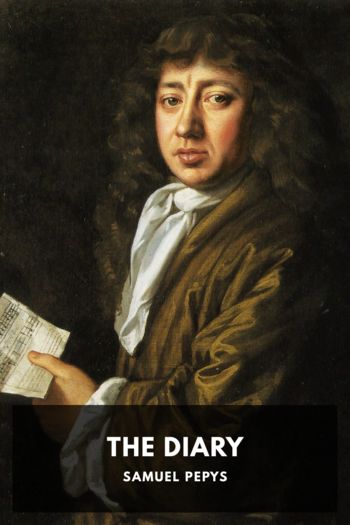The Diary - Samuel Pepys (red white and royal blue hardcover txt) 📗

- Author: Samuel Pepys
Book online «The Diary - Samuel Pepys (red white and royal blue hardcover txt) 📗». Author Samuel Pepys
Thomas Edwards married Jane Birch in 1669, and died in 1681. Pepys interested himself to get their son, Samuel Edwards, into the Bluecoat School in 1682. See note 2263. ↩
There is a copy of Pepys’s letter to the Commissioners of Accounts in defence of himself in respect to the buying of East India prize goods in 1665, among the Rawlinson MSS. (Bodleian), A. 174 (301). ↩
The Lord Chamberlain’s Records contain a copy of a warrant dated July 12th, 1661, “to deliver to Mr. Killegrew thirty yards of velvett, three dozen of fringe, and sixteene yards of Damaske for the year 1661.” The heading of this entry is “Livery for ye jester” (Lowe’s Betterton, p. 70). ↩
George Tompson. See note 3808. ↩
“Feb. 1, 1668. Capt. J. Perriman to Sam. Pepys. Mark Croney, who bought the Leister wreck at Blackwall, says that Capt. Dorington, one of the owners, has forbidden his servants to work any more upon her, or to meddle with anything there, although Croney has paid his money for the wreck.”
Calendar of State Papers, 1667–68, p. 206↩
Secret service money. ↩
See 10th and 24th June, 1666. ↩
Of which Sir Philip was Governor. The account of the money expended by Sir P. Honiwood on the fortifications at Portsmouth, between August, 1665, and April, 1667, is in the Sloane MS., 873. —B. ↩
See note 3303. ↩
Sir William Coventry’s love of money is said by Sir John Denham to have influenced him in promoting naval officers, who paid him for their commissions.
“Then Painter! draw cerulian Coventry,
Keeper, or rather Chancellor o’ th’ sea;
And more exactly to express his hue,
Use nothing but ultra-marinish blue.
To pay his fees, the silver trumpet spends,
And boatswain’s whistle for his place depends.
Pilots in vain repeat their compass o’er,
Until of him they learn that one point more:
The constant magnet to the pole doth hold,
Steel to the magnet, Coventry to gold.
Muscovy sells us pitch, and hemp, and tar;
Iron and copper, Sweden; Munster, war;
Ashley, prize; Warwick, custom; Cart’ret, pay;
But Coventry doth sell the fleet away.”
—B. ↩
See note 3447. ↩
This is a curious reference to the first use of an expression which has not obtained a permanent position in the language. ↩
The turquoise. This stone was sometimes referred to simply as the turkey, and Broderip (Zoological Recreations) conjectured that the bird (turkey) took its name from the blue or turquoise colour of the skin about its head. ↩
There are many references to Captain De la Roche among the State Papers (see note 3926). ↩
“The Earl of Sandwich was still at Lisbon, expecting in few days the return of the ratification of the Treaty from Madrid.”
The London Gazette, No. 236—B. ↩
This prologue, “spoken by Mrs. Ellen and Mrs. Nepp,” is prefixed to Sir R. Howard’s Great Favourite, or the Duke of Lerma, 4to., 1668. It is too dull to reprint; and the merit must have consisted more in the manner in which it was delivered, than in the matter, as it came from the pen of the author. —B. ↩
Apparently Thomas Beckford (see note 868 and note 2690). ↩
Of Lowther, in Westmoreland, for which county he was knight of the shire before and at the Restoration. He had been made a baronet of Nova Scotia in 1640. —B. ↩
Pepys here refers to the extraordinary proceedings which occurred between Charles, Lord Gerard, and Alexander Fitton, of which a narrative was published at the Hague in 1665. Granger was a witness in the cause, and was afterwards said to be conscience-stricken from his perjury. Some notice of this case will be found in North’s Examen, p. 558; but the copious and interesting note in Ormerod’s History of Cheshire, vol. iii, p. 291, will best satisfy the reader, who will not fail to be struck by the paragraph with which it is closed—viz., “It is not improbable that Alexander Fitton, who, in the first instance, gained rightful possession of Gawsworth under an acknowledged settlement, was driven headlong into unpremeditated guilt by the production of a revocation by will which Lord Gerard had so long concealed. Having lost his own fortune in the prosecution of his claims, he remained in gaol till taken out by James II to be made Chancellor of Ireland (under which character Hume first notices him), was knighted, and subsequently created Lord Gawsworth after the abdication of James, sat in his parliament in Dublin in 1689, and then is supposed to have accompanied his fallen master to France. Whether the conduct of Fitton was met, as he alleges, by similar guilt on the part of Lord Gerard, God only can judge; but his hand fell heavily on the representatives of that noble house. In less than half a century the husbands of its two co-heiresses, James, Duke of Hamilton, and Charles, Lord Mohun, were slain by each other’s hands in a murderous duel arising out of a dispute relative to the partition of the Fitton estates, and Gawsworth itself passed to an unlineal hand, by a series of alienations complicated beyond example in the annals of this country.” —B. ↩
See February 9th, ante. ↩
Musurgia Universalis, sive ars magna Consoni et Dissoni in X libros digesta, printed at Rome, in 1650, in two volumes, folio. The work of the learned but untrustworthy writer, Athanasius Kircher. ↩
Skinner.





Comments (0)